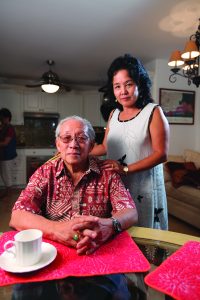 At some point in our lives, most of us will be given the opportunity to care for someone with cancer. Even though our experience with cancer may be limited, we may have learned enough to ask initial questions of the patient after the diagnosis is made, such as:
At some point in our lives, most of us will be given the opportunity to care for someone with cancer. Even though our experience with cancer may be limited, we may have learned enough to ask initial questions of the patient after the diagnosis is made, such as:
- What kind of cancer and where is it?
- What stage is it?
- Do you need surgery?
- Do you need chemotherapy or radiation?
- How will this affect your future plans?
- What kind of support groups are available in the community for this kind of cancer?
Answers to these questions may not be available until more information is obtained from a specialist. Referrals to “other doctors” are usually the first step. Specialists could be surgeons, oncologists or treatment physicians focused on the type of cancer. Being an advocate and researching the disease, treatments, causes, support groups and physician can help answer these questions, but this takes time and can be challenging for the family. Resources are available online and there are always friends who have “been through this before.” Sometimes, the patient and family are in such a state of emotional anxiety they don’t know what to do next. That’s when reaching out to another person during this time may help the family cope with this responsibility. Someone who is detached from the shock of the diagnosis can often offer support and bring some serenity to the situation. This could be a family member or friend, or if you are fortunate, someone who is in the medical field. The main message here is to not go through the process on your own but to ask for assistance. An advocate or advocates can help by doing the following:
◆ Know the family history and information about the patient’s background health. This way, the patient will not have to try to remember all of the questions the doctor will ask her/him at the appointment.
◆ Understand what the patient’s objectives are. Life goals and dreams for the future are important for the doctor to consider. Patients may have a hard time explaining these things on their own.
◆ Take notes and organize the information in a folder so the details can be accessed afterward by the patient and family. This may include information about the chemotherapy names, side effects and time frames. Developing a “partnership” attitude allows physicians and patients to work alongside each other to choose the best course of treatment. As an advocate, you can focus on what is being discussed, ask questions on behalf of the patient and allow all involved to have a clear understanding of the plan. Discussions should consider the risks and benefits of all options. There will be critical decisions that need to be made quickly.
The most important part of helping someone through cancer is to be there, hold their hand and give support, no matter the outcome.
ATTENTION PLUS CARE HOME HEALTHCARE
Accredited by The Joint Commission
1580 Makaloa St., Ste. 1060, Honolulu HI 96814
808-739-2811 | www.attentionplus.com
AGING IN HAWAII EDUCATIONAL OUTREACH PROGRAM by Attention Plus Care — a program providing resources for seniors and their families, covering different aging topics each month. For class information and upcoming topics, call 808-440-9356.


Leave a Reply